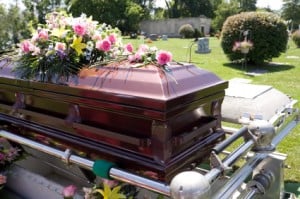 Knowing what to wear to a funeral can be an added stress when you’re already grieving the loss of a loved one—especially if you don’t have the time or money to shop for a new outfit. For a quick and easy look at funeral attire tips, we’ve outlined some of the biggest dos and don’ts. (more…)
Knowing what to wear to a funeral can be an added stress when you’re already grieving the loss of a loved one—especially if you don’t have the time or money to shop for a new outfit. For a quick and easy look at funeral attire tips, we’ve outlined some of the biggest dos and don’ts. (more…)
Posts Tagged ‘death’
Funeral Attire Dos and Don’ts
Thursday, January 21st, 2016How to Tell Your Loved Ones You’d Like to Be Cremated
Tuesday, January 5th, 2016 Even though over 40 percent of Americans opt for cremation over burial, there are still many different kinds of religious, cultural, and personal taboos that make cremation a difficult decision. This is especially true if your family has traditional views regarding funeral planning or has a long history of burial in a particular cemetery.
Even though over 40 percent of Americans opt for cremation over burial, there are still many different kinds of religious, cultural, and personal taboos that make cremation a difficult decision. This is especially true if your family has traditional views regarding funeral planning or has a long history of burial in a particular cemetery.
If you’ve decided on cremation but aren’t quite sure how to tell your family, we suggest you set aside a time to have this important conversation. It’s never a good idea to leave this sort of thing as a surprise, so the sooner you can open up to those you love, the more time you’ll have to enjoy what’s left of your time together.
Cemetery Etiquette and You
Saturday, May 16th, 2015Most people know how to behave at a funeral or a memorial service, when respect and reverence are called for in equal proportions, but cemeteries provide a trickier funeral etiquette question. After all, cemeteries are public places open to the entire community—not only as a place to mourn, but to visit relatives, research local history, enjoy the ambiance, and even go for a jog.
Most cemeteries have their formal rules posted near the gates, and you should always take a moment to read them for specific information about where you can go and when. It’s also a good idea to follow these general cemetery guidelines. (more…)
What is the Difference between a Casket and a Coffin?
Saturday, February 28th, 2015 Outside the funeral industry, the terms “casket” and “coffin” are often used interchangeably to describe the vessel in which the deceased is placed before being buried in the ground. Most people recognize both words, and are comfortable using both in situations related to death and burial.
Outside the funeral industry, the terms “casket” and “coffin” are often used interchangeably to describe the vessel in which the deceased is placed before being buried in the ground. Most people recognize both words, and are comfortable using both in situations related to death and burial.
In reality, a casket and a coffin are not the same things. A coffin (a term that has been around since the 1500s) is the traditional burial box we associate with death. Shaped to fit the human body (with six or eight sides, wider at the top for the arms and torso), a coffin is designed to be built fairly cheaply and with a minimum amount ofmaterials. Because many people in history built their own coffins, or hired a coffin maker to do it, the emphasis was on practical burial that didn’t put a strain on family finances. Coffins are almost always made of wood instead of more valuable metals.
How Celebrity Deaths Affect Us
Wednesday, February 4th, 2015 Nothing arouses curiosity quite like a death—and a celebrity’s death is cause for even more speculation. In addition to questions about how and why a beloved media icon passed on, we often find ourselves questioning our own emotional responses. (more…)
Nothing arouses curiosity quite like a death—and a celebrity’s death is cause for even more speculation. In addition to questions about how and why a beloved media icon passed on, we often find ourselves questioning our own emotional responses. (more…)
How Much Does Burial Insurance Cost?
Saturday, April 5th, 2014 One of the easiest ways to pre-pay for a funeral is to buy burial insurance (also known as funeral insurance). Instead of picking out details like caskets or cemeteries now, you simply set aside a lump sum that is payable out to your beneficiary upon your death. They can then use the money to fund your funeral in a way that fits with your wishes and their grieving needs.
One of the easiest ways to pre-pay for a funeral is to buy burial insurance (also known as funeral insurance). Instead of picking out details like caskets or cemeteries now, you simply set aside a lump sum that is payable out to your beneficiary upon your death. They can then use the money to fund your funeral in a way that fits with your wishes and their grieving needs.
Because burial insurance is a “guaranteed” payout (unlike car insurance, which will only pay out in the event of an accident, everyone will eventually die and collect on their burial policy), most of the costs are fixed. Your policy provider will take into account your age, your desired method of payment, and how large your payout is. From there, you will choose a policy that fits with your needs. This means that while one person (say, a 50-year-old in good health) might pay a fairly small monthly charge, another person (someone in their 70s who is a smoker) can expect larger monthly fees and even big upfront costs.
After Funeral Planning: The First Year
Thursday, August 16th, 2012 You’ve said goodbye to your loved one the best way you know how, tied the loose ends up from the funeral planning, and are getting ready to face the most difficult task ahead of you: the first year. Although everyone grieves in a different way, and there is no way to prepare for the emotional hardships that lay ahead of you, most people agree that the first few months are always the hardest.
You’ve said goodbye to your loved one the best way you know how, tied the loose ends up from the funeral planning, and are getting ready to face the most difficult task ahead of you: the first year. Although everyone grieves in a different way, and there is no way to prepare for the emotional hardships that lay ahead of you, most people agree that the first few months are always the hardest.
And while no one can tell you how best to handle your grief, you can at least rely on the support of financial advisors to help you get your personal affairs into order. (This is most important when you’ve recently lost a spouse or life partner, although dealing with a parent’s finances might also be a factor for adult children.)
When an Unexpected Death Occurs
Tuesday, August 7th, 2012 Much of the information you’ll find online (and here at our blog) has to do with funeral pre-planning. We always encourage people to look ahead to those difficult times, since making financial and physical arrangements can greatly reduce the burden on loved ones. This is especially true for those in the retirement planning stages of their life.
Much of the information you’ll find online (and here at our blog) has to do with funeral pre-planning. We always encourage people to look ahead to those difficult times, since making financial and physical arrangements can greatly reduce the burden on loved ones. This is especially true for those in the retirement planning stages of their life.
Unfortunately, death isn’t always something we can plan for. Many times, the loss of a loved one occurs out of the blue or when they are at an age when such a thing shouldn’t be possible. If this is the case, and you haven’t had any time to prepare or learn about funeral planning, you can expect to follow a timeline similar to this:





